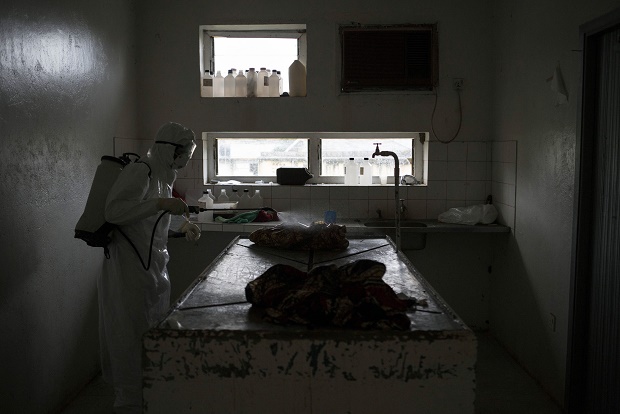AP: Bungling by World Health Organization hurt Ebola response

In this Sept. 24, 2014 file photo, a health worker sprays disinfectant onto the corpses of children suspected of dying from the Ebola virus, in a morgue in Kenema, eastern Sierra Leone. An Associated Press investigation has found a toxic mix of avoidable problems faced by Ebola responders, including weak leadership, shoddy supplies and infighting, exacerbated a chaotic situation at a critical front in the battle against the virus. AP
KENEMA, Sierra Leone — Something didn’t smell right.
As a worker at Kenema Government Hospital mixed a batch of chlorine on a broiling August day, he noticed it didn’t have its typically strong, bleach-like odor. Concerned, he turned to a consultant with the World Health Organization, who tested the disinfectant and found barely any active ingredient.
“I was deeply shocked,” the consultant, Jerome Souquet, wrote in an email to his boss in Freetown, Sierra Leone’s capital. Souquet said the consequences of using the ineffective chlorine “could be catastrophic, and cause immediate infection of all the staff.”
Questionable chlorine was just one of a toxic mix of avoidable problems faced by Ebola responders in Kenema last summer as the outbreak was spiking. Weak leadership, shoddy supplies and infighting exacerbated a chaotic situation at a critical front in the battle against the virus, an Associated Press investigation has found. More than 40 health workers died in Kenema — a devastating loss in the fight to control an epidemic that has claimed more than 11,000 lives.
In March, AP reported that senior officials at WHO’s Geneva headquarters resisted calls to declare Ebola an international health emergency — the equivalent of an SOS signal — on political and economic grounds. But newly obtained documents, recordings of conference calls and interviews with key players on the ground show that even after the alarm was raised, WHO and others struggled to put together a decisive response.
Article continues after this advertisementThe World Health Organization’s Director-General Dr. Margaret Chan — whose U.N. agency is charged with leading the fight against global outbreaks — demanded the dispatch of vehicles and equipment, but penny-pinching meant only a trickle of cash made its way to frustrated responders. Supplies were so scarce that body bags — which protect aid workers from exposure to the highly contagious corpses — ran out. Confusion delayed the construction of a new treatment clinic.
Article continues after this advertisementExperts say the fumbling cost lives across West Africa.
READ MORE: Better response needed